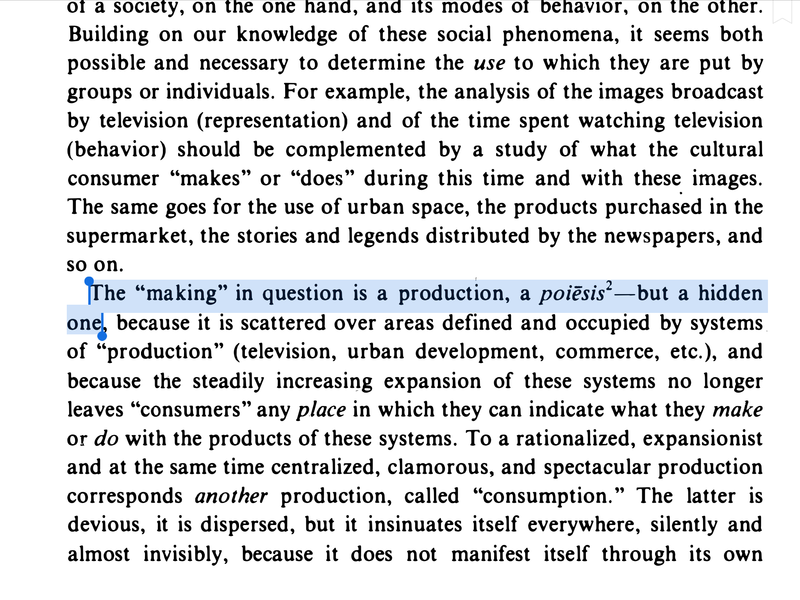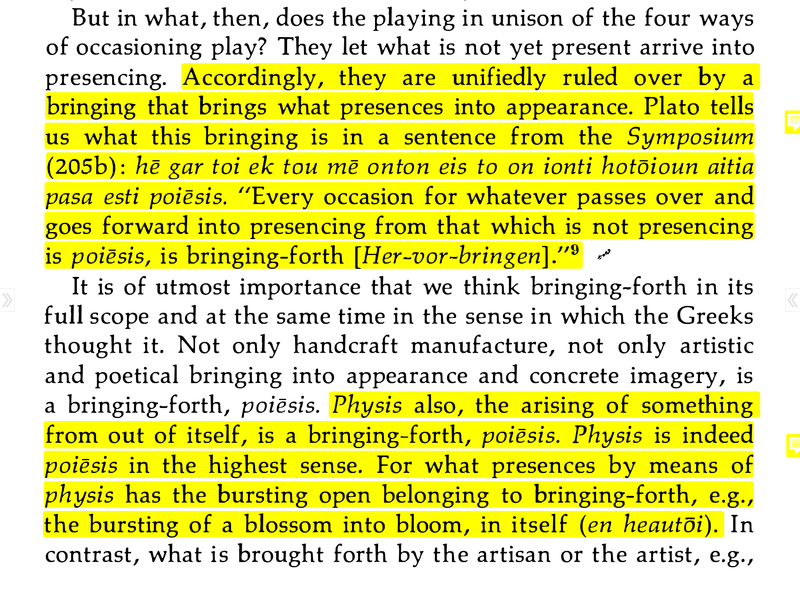i’m interested in meaning making - how meaning is made as an integral part of what meanings we make. I don’t need a definition of meaning or of making. I’m looking for a term or word or phrase that communicates the art of meaning making and that will fit well with anarchic. Epistemology doesn’t even come close, because knowledge is not what I am after, at least not in its typically commodified information acquisition senses. How we know need not be the same as how we make meaning. My intuition suggests that what I seek approximates an uneasy combination of Michael Polanyi’s tacit dimension and Michel de Certeau’s infinite poiesis of the everyday. Initially, I was drawn to poiesis language because of the deep imprint practice theory has left on me that meanings are made not discovered. Here is a bit from Steven Rendall translating de Certeau’s The Practice of Everyday Life, p. xii,
 Use is a making, a poiesis. At the beginning of The Practice of Everyday Life we already find the hints of an anarchic entanglement of strategy and tactic, two kinds of production that make each other. This reminds me of the cultural history of bible approach, which holds the notions of production and reception together in a similarly infinite cooperation.
Use is a making, a poiesis. At the beginning of The Practice of Everyday Life we already find the hints of an anarchic entanglement of strategy and tactic, two kinds of production that make each other. This reminds me of the cultural history of bible approach, which holds the notions of production and reception together in a similarly infinite cooperation.
Yet, poiesis also plays an important role in Martin Heidegger’s famous treatise on technology, “The Question Concerning Technology.” The dominance of self-presencing in the relationship between poiesis, aletheia, and techne in Heidegger’s explorations of technology hides the “silently and almost invisibly” of the poiesis in de Certeau’s everyday use. Here is the first mention of poiesis in William Lovitt translating Martin Heidegger’s “The Question Concerning Technology,” p. 10,
 Physis as “poiesis in the highest sense” seems decidedly different than the tactical poiesis of use in everyday practice. Poiesis as a bringing-forth, a revealing (aletheia), neglects the concealment and hiddenness constitutive of simulacrum, thirdspace and the face as meaning making endeavors. Yet, if we take poiesis together with anarchic (lack of recourse to the reign of an original), perhaps we push this term for making toward something otherwise than presencing.
Physis as “poiesis in the highest sense” seems decidedly different than the tactical poiesis of use in everyday practice. Poiesis as a bringing-forth, a revealing (aletheia), neglects the concealment and hiddenness constitutive of simulacrum, thirdspace and the face as meaning making endeavors. Yet, if we take poiesis together with anarchic (lack of recourse to the reign of an original), perhaps we push this term for making toward something otherwise than presencing.
Poetics, a word closely related to poiesis, compells me most as a way of talking about meaning making. The way I want to imagine my work and all human meaning making is as a poetics. I have always wanted to be a poet, though I’m not even sure what I mean by poet. From my days as a musician to my academic career, I have gravitated more toward the sounds of words than to their precise linguistic meaning. I wish to write sentences that capture readers through cadence more than coherence. Of course, cadence and coherence need not be mutually exclusive, but it is sound that drives me. For me, sound reverberates in ways that open the meaning making process rather than close it; sound challenges the consumptive analytic mode.
So, without any training in poetics (whether criticism or craft), I somehow associate the poetic with making sound, and sound with meaning that resists commodification. In fact, it is the similar sound of poiesis and poetics that surfaced the question of their relation for me. My particular academic habitus suggests that I go back and listen to what Aristotle might have meant by poetics as a way of legitimating my inclination toward poetic language. Yet, I don’t feel compelled by Aristotle other than as a potential salve for my axiety about using the term poetic unhospitably.
Without recourse to Aristotle at the moment, I will try on these words and see what they generate. Can I say that the face in Levinas, simulacrum in Baudrillard, and thirdspace in Soja perform meaning making as an anarchic poetics? Does poetics itself signal a kind of anarchic poiesis, making anarchic poetics redundant?
as you will find below, my friend Justin Barber has helped me listen to Aristotle in Poetics 1447a-b. I will have more to say on this along the way.